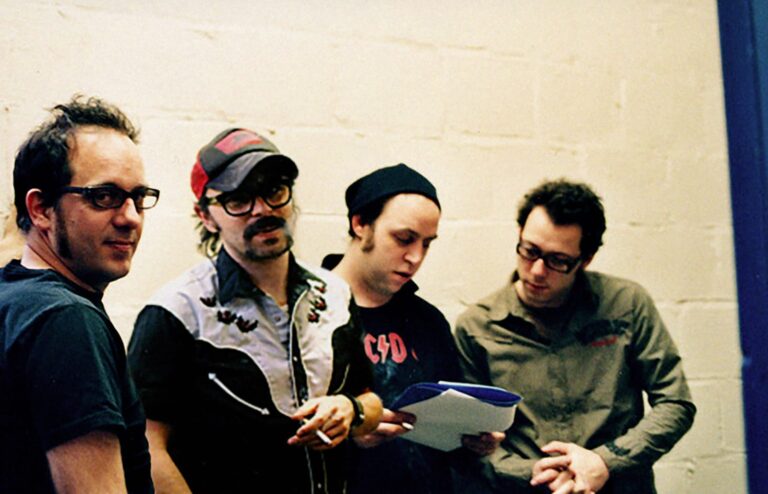By Glenn Alderson
A deep-listening session reveals how Apple Music’s sonic innovation reshapes the way we hear.

Coming together with a shared goal to offer more support to Montreal’s musical “middle class,” Gourmet Délice, Jean-Christian Aubry, Yanick Masse and Pierre Gourde, three of them musicians themselves, built a foundation that would stand 20 years later as one of the nation’s most respected labels. In celebration of Bonsound’s 20th anniversary, we caught up with Délice to take a look back on some of the moments that got him here.
Originally from Quebec City, Délice moved to Montreal in the ‘90s and played in a few rock and punk bands, also establishing indie label Blow the Fuse and working as a graphic designer at distribution company Fusion III. Already revelling in Montreal’s vibrant live music scene and creating diverse compilations – of both genre and language – to release on his label, Délice credits his time at Fusion III for giving him more of an insider’s view at the inner workings of the music industry he loved to take in at venues like the Jailhouse Rock Café.
“I was like a kid in a candy store going to see everything, my life was revolving around doing whatever I needed to do to go to see shows,” he says. “Eventually I worked at Fusion III, which was one of the big importers of really cool labels from around the world and mostly Europe. So I got to know a lot of the business side of things through that job.”
Although it wasn’t their conscious plan at the start, combining Délice’s passion for live music with a business partner, Aubry, specializing in the label side of things, Gourde doing booking and Masse on the management side was a recipe for success – though this success was amplified by the fact that Délice and Aubry being into, as he says, “everything, by necessity.” The four first came together when Masse, who was managing the band Les Breastfeeders, approached Aubry for a marketing grant. One thing led to another when he came to Délice to put the record out on his label, Blow the Fuse, where Gourde was already working on the booking side for Les Breastfeeders, Délice’s band Le Nombre, and Aubry’s own band, Gwenwed. Les Breastfeeders’ first record was released on Blow the Fuse in 2004, four or five months before Bonsound’s official creation. Although the band became an essential part of Bonsound’s history, Les Breastfeeders continued officially releasing on Blow the Fuse until joining the Bonsound roster with their most recent album, released this year.
Since the two label options between the quartet were too boxed into genre categories, the quartet landed on creating a more “generalist” label. Bonsound’s first release was a 45 by American singer-songwriter Eleni Mandell, before putting out their first record as a label in 2008.
Bonsound’s more “generalist” mentality opened the door for some boundary-pushing acts to land on their label, raising their profile when they ultimately proved to be something special. Délice describes the first time he knew he might have built something life-changing was when they signed Malajube one month in.
“This guy that had a label called Dare to Care, which is now Bravo Musique, he was a one-man operation and signed Malajube, and he said ‘They don’t have management or booking, I can’t do it because I’m just one person doing label stuff. You guys just opened, would you like to manage them and book them?’” Délice says.

Malajube cira 2016
“They had a sound that could come from anywhere. You couldn’t say “Oh, this is a band from Quebec,” it was really something that we didn’t have here. They exploded pretty quickly, the whole run with that band was quite impressive and brought us really far. People would come back to me and go ‘Oh, they sing in French! I didn’t know!’ Even the vocals were mixed as an instrument, so you couldn’t hear right away that it was French, and that made them go far in non-Francophone territories.”
Things got taken even further when Bonsound did its first showcase at SXSW in 2007, bringing six of their flagship acts – Malajube, Les Breastfeeders, DJ Champion, Creature, The Dagons and Call Me Poupée – to showcase the label’s sonically diverse array of talents. Délice says that it was the first time he felt anything was truly possible, as it was his first time getting to mingle with other labels in another country.

(L-R) Champion – Chill ‘Em All, Lisa LeBlanc – Highways, Heartaches, And Time Well Wasted, Gwenwed – l’amour la haine les animaux les automobiles.
Délice already had deep connections and memories with these acts. A partnership with Universal Music Mexico saw Creature get booked to play a festival put on by a local Top 40 radio station, which took place in the 87 thousand-capacity Estadio Azteca in Mexico City. Standing in the stadium was something Délice calls one of his most impressive moments, and something he never could have foreseen. DJ Champion, as well, was another act that he says continued to expand his musical palate and cemented his work as a career path he loved.
“He wasn’t like a radio DJ, it was more like electronic music mixed with guitars, and in the live setting that’s very interesting – he directed the musicians like the conductor of an orchestra. In 2006 or 2007, we filled the Metropolis [now MTELUS] 10 times in one year, so this guy also changed our lives,” he says.
“I really wasn’t in that scene at all, and I wasn’t convinced just hearing the music, but then I went to see a show and I was mesmerized and blown away by it. Everyone was into it, the security, the staff at the bar, hands in the air, sold out and everyone went crazy. That was an eye-opening moment, understanding that it’s the live aspect that I like and also that I don’t really care about the genre of music – if it does something to me, it does something to me, and that’s amazing.”

(L-R) Population II – Serpent Échelle, Elisapie – Inuktitut, Dead Obies – Gesamtkunstwerk.
In more recent years, Délice points to Elisapie’s success at the Junos with her most recent project, Inuktitut, as a standout moment, but at the end of the day, what Délice remembers and cherishes the most is being able to step into the office and see the operations growing more and more over the years. The label just had their 20th anniversary party, but Délice didn’t even want to celebrate too much – because he believes his work is far from over.
“What I like about Bonsound is the fact that it’s a group effort, you have to fight for your ideas and make sure everybody agrees. It’s always trying to get the best idea to win,” he says. “It’s the sum of everything, because I wouldn’t want to be like – ‘Wow, 20 years, we made it, this is a big thing,’ because it would make everything after pale in comparison. It’s all the difficulties. It’s all the little wins that sum up and make it worth the while.”
By Glenn Alderson
A deep-listening session reveals how Apple Music’s sonic innovation reshapes the way we hear.
By Cam Delisle
Dominic Weintraub and Hugo Williams take audiences on a treadmill-fueled ride through the chaos and hope of modern life.
By Cam Delisle
How the once boutique industry showcase became the city’s ultimate music connector, according to its Artistic Director, Mikey Rishwain.